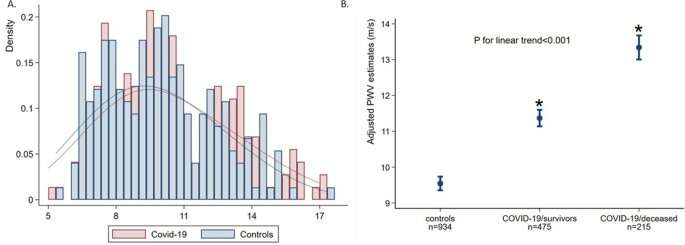Stiffness of arteries could indicate severe COVID risk

Assessing the stiffness of the arteries could help identify patients most at risk of dying from COVID-19, new research has revealed.
Estimated pulse wave velocity (ePWV), a readily available marker of aortic stiffening, has been shown to be an effective addition in identifying patients at risk of death in hospital due to the virus.
Accurate risk stratification at hospital admission of these patients is of utmost clinical importance as it is needed to guide therapeutic strategies.
The research is published in Scientific Reports today by Professor Konstantinos Stellos and Visiting Clinical Professor Kimon Stamatelopoulos at Newcastle University, UK and the Newcastle Hospitals NHS Foundation Trust. It demonstrates that ePWV provides an additional clinical tool to refine risk stratification of hospitalized patients beyond established risk factors and scores.
The study was carried out in two cohorts of hospitalized COVID-19 patients; 471 in the Newcastle upon Tyne Hospitals NHS Foundation Trust, Newcastle, UK and 266 in the University Hospital of Pisa, Tuscany, Italy and in a control cohort of 934 non-COVID-19 individuals in the Department of Clinical Therapeutics, National and Kapodistrian University of Athens, Athens, Greece.
It was found that the addition of ePWV to clinical predictive markers or a validated mortality score improved the prognostic value for in-hospital mortality and therefore could facilitate therapeutic decisions in acute COVID-19 disease.
Professor Stellos, Professor of Cardiovascular Medicine at Newcastle University and Heidelberg University, said: "Our findings suggest that increased aortic stiffening may serve as a predictor of mortality in COVID-19 infection reflecting a cumulative surrogate of aging and high-risk cardiovascular profile."
The team found that the optimal prognostic ePWV value was 13.0 m/sec for predicting in-hospital mortality.
When the total cohort of patients with COVID-19 (n=737) was compared with the total control cohort (n=934), ePWV progressively increased across the controls, COVID-19 survivors and COVID-19 patients who didn't survive after controlling for age, sex, hypertension and other relevant factors. ePWV was significantly higher in COVID-19 patients as compared to their non-COVID-19 counterparts.
The readily available measure of arterial stiffness when used in addition to tools already recommended in clinical practice may facilitate therapeutic decisions in acute COVID-19 disease. The team will be continuing further research in this area to develop the technique and seek its validation into health service practice.
What is estimated pulse wave velocity?
Pulse-wave velocity (ePWV) is a measurement of arterial stiffness that is an independent predictor of cardiovascular risk. It can be measured simply and noninvasively by measuring the carotid and femoral pulse pressures, with sensors on the ankles and neck, and the time delay between the two or by other methods relying on pulse-wave analysis.
More information: Estimated pulse wave velocity improves risk stratification for all-cause mortality in patients with COVID-19. Scientific Reports. DOI: doi.org/10.1038/s41598-021-99050-0




















